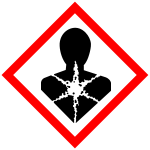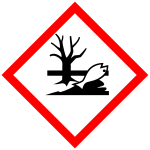Notified classification and labelling according to CLP criteria
General Section
EC / List no.

|
Name |
CAS Number

|
Additional Notified Information

|
|---|---|---|---|
| 263-000-1 | Naphthenic acids, nickel salts | 61788-71-4 |
| Classification | Labelling | Specific Concentration limits, M-Factors | Notes |
Classification affected by Impurities / Additives

|
||
|---|---|---|---|---|---|---|
| Hazard Class and Category Code(s) | Hazard Statement Code(s) | Hazard Statement Code(s) | Supplementary Hazard Statement Code(s) | |||
| Acute Tox. 4 | H302 | H302 | M=1 |
|||
| Skin Sens. 1 | H317 | H317 | ||||
| Resp. Sens. 1 | H334 | H334 | ||||
| Muta. 2 | H341 | H341 (Suspected of ca...) | ||||
| Carc. 1A | H350i (inhalation) | H350i | ||||
| Repr. 1B | H360 (H360:May damage...) | H360 (May damage fert...) | ||||
| STOT RE 1 | H372 (other:Lungs) | H372 (Causes damage t...) | ||||
| Aquatic Acute 1 | H400 | |||||
| H410 | ||||||
| Aquatic Chronic 2 | H411 | |||||
| Signal Words | Pictograms | |||||||||
|---|---|---|---|---|---|---|---|---|---|---|
| Danger |
|
Detailed Information on classification and labelling
Classification
| Physical and Chemical hazards | |||
|---|---|---|---|
| Hazard Category | Hazard Statement |
Reason for no Classification

|
|
| Explosives | data lacking | ||
| Flammable Gases and Chemically Unstable Gases | data conclusive but not sufficient for classification | ||
| Flammable Aerosols | data conclusive but not sufficient for classification | ||
| Oxidising Gases | data conclusive but not sufficient for classification | ||
| Gases Under Pressure | data lacking | ||
| Flammable Liquids | data lacking | ||
| Flammable Solids | data conclusive but not sufficient for classification | ||
| Self-reactive Substances and Mixtures | data lacking | ||
| Pyrophoric Liquids | data lacking | ||
| Pyrophoric Solids | data conclusive but not sufficient for classification | ||
| Self-heating Substances and Mixtures | data lacking | ||
| Substances and Mixtures which in contact with water emit flammable gases | data lacking | ||
| Oxidising Liquids | data lacking | ||
| Oxidising Solids | data conclusive but not sufficient for classification | ||
| Organic Peroxides | data lacking | ||
| Substances and Mixtures corrosive to Metals | data lacking | ||
| Desensitized Explosives | data lacking | ||
| Human Health hazards | |||
| Hazard Category | Hazard Statement |
Reason for no Classification

|
|
| Acute Toxicity - Oral | Acute Tox. 4 | H302 | |
| Acute Toxicity - Dermal | data conclusive but not sufficient for classification | ||
| Acute Toxicity - Inhalation | data lacking | ||
| Skin Corrosion / Irritation | data conclusive but not sufficient for classification | ||
| Serious Eye Damage / Eye Irritation | data lacking | ||
| Respiratory Sensitisation | Resp. Sens. 1 | H334 | |
| Skin Sensitisation | Skin Sens. 1 | H317 | |
| Aspiration Hazard | data lacking | ||
| Germ Cell Mutagenicity | Hazard Category | Hazard Statement |
Reason for no Classification

|
| Germ Cell Mutagenicity | Muta. 2 | H341 | |
| Carcinogenicity | Hazard Category | Hazard Statement |
Reason for no Classification

|
| Carcinogenicity | Carc. 1A | H350i | |
| Route of exposure | inhalation | ||
| Reproductive Toxicity | Hazard Category | Hazard Statement |
Reason for no Classification

|
| Reproductive Toxicity | Repr. 1B | H360 | |
| Specific Effect | H360:May damage fertility or the unborn child. | ||
| Effects on or via Lactation | data lacking | ||
| Specific target organ toxicity - Single | Hazard Category | Hazard Statement |
Reason for no Classification

|
| Specific target organ toxicity - Single | data lacking | ||
| Specific target organ toxicity - Repeated | Hazard Category | Hazard Statement |
Reason for no Classification

|
| Specific target organ toxicity - Repeated | STOT RE 1 | H372 | |
| Affected Organs | other:Lungs | ||
| Environmental Hazards | |||
| Hazardous to the aquatic environment | Hazard Category | Hazard Statement |
Reason for no Classification

|
| Hazardous to the aquatic environment - acute | Aquatic Acute 1 | H400 | |
| Hazardous to the aquatic environment - chronic | Aquatic Chronic 2 | H411 | |
| Hazardous to the atmospheric environment | Hazard Category | Hazard Statement |
Reason for no Classification

|
| Hazardous to the ozone layer | data lacking | ||
| Additional Hazard Classes | Additional Hazard Statements |
|---|---|
| No available Data | |
Labelling
| Hazard Statement Code(s) | Phrase | Additional Text |
|---|---|---|
| H350i | May cause cancer by inhalation. | |
| H302 | Harmful if swallowed. | |
| H317 | May cause an allergic skin reaction. | |
| H334 | May cause allergy or asthma symptoms or breathing difficulties if inhaled. | |
| H341 | Suspected of causing genetic defects |
Suspected of causing genetic defects. |
| H360 | May damage fertility or the unborn child |
May damage fertility or the unborn child. |
| H372 | Causes damage to organs |
Causes damage to organs (Lungs) through prolonged or repeated exposure. |
| H410 | Very toxic to aquatic life with long lasting effects. |
| Note Title | Note Text |
|---|---|
| No available Data | |


